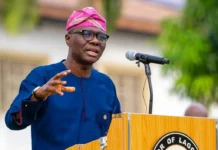
WHEN President Goodluck Jonathan on January 7, 2012 ordered a cut on the basic salaries of political appointees at the federal level by 25 per cent, it was a kind of Executive fiat.
It was one of the steps taken then by the President to pacify aggrieved Nigerians over his removal of subsidy from petrol last January 1, which was greeted with wild protests, strikes and rallies across the country.
But 26 days after the President gave the order, the policy is yet to be implemented for several reasons, some legislative and others, from obvious inaction by the authorities vested with such responsibilities.
The Guardian learnt that before the directive can be enforced, there must be a circular from the Office of the Secretary to the Government of the Federation (SGF) to the Revenue Mobilisation Allocation and Fiscal Commission (RMAFC), which will liaise with the National Assembly for an amendment of the Act on public officers’ pay before any reduction can be made.
In the absence of a law to enforce the President’s order, some members of the National Assembly told The Guardian yesterday that the consent of the officers affected would make the policy implementable until the Act is amended. They said since there is no law in the country that empowers the President or any other public official to cut the salaries of political appointees, their consent must be obtained before the action could be enforced.
At the time of filing this report, the government had not issued any circular on the issue. And so, it is still a waiting game both in the federal cabinet and RAMFC.
A check across Ministries, Departments and Agencies (MDAs) in Abuja by The Guardian also showed that the SGF’s circular was being awaited.
The SGF’s memo is the first step towards effecting such deduction because salaries of political office holders are backed by an Act of Parliament, which means it requires an amendment before action can be taken.
The SGF’s office however told The Guardian yesterday that the Finance Minister had been directed to effect the deduction.
Before now, Nigerians had described the basic salary deduction as “tokenism” while some public affairs analysts and government officials told The Guardian that other pronouncements contained in the broadcast were mere political statements with little or no clear-cut enforcement.
For instance, a government official in Abuja asked, albeit, rhetorically: “What parameters determine important and less important travels by political office holders? What and who determine the number of delegations on foreign trips?”
In the national broadcast during the anti-fuel subsidy removal national rallies, Jonathan said in line with the current realities and his administration’s determination to cut down on government’s spending, the salaries of all federal political appointees had been slashed by 25 per cent. He also unveiled the Subsidy Reinvestment and Empowerment Scheme (SURE) programme and cut down the pump price of petrol from N140 to N97 a litre.
The government also pledged to restrict foreign trips by its officials to only the critical ones.
Jonathan had said: “For the year 2012, the basic salaries of all political office holders in the Executive arm of government will be reduced by 25 per cent. Government is also currently reviewing the number of committees, commissions and parastatals with overlapping responsibilities. The report on this will be submitted shortly and the recommendations will be promptly implemented. In the meantime, all MDAs must reduce their overhead expenses.”
He continued: “To save Nigeria, we must all be prepared to make sacrifices,” adding that “on the part of government, we are taking several measures aimed at cutting the size and cost of governance, including on-going and continuous effort to reduce the size of our recurrent expenditure and increase capital spending.”
While the new cost of petrol or premium motor spirit was immediately enforced, the situation is different for the salary reduction for his appointees.
The country’s workers led by the Nigeria Labour Congress (NLC) and the Trade Union Congress in collaboration with the civil society groups coordinated by the Joint Action Front (JAC) organised the weeklong protests to compel government to revert to N65 a litre price of petrol. Although the goal was not realised, Labour called off the strike while the government deployed troops in Lagos to stop rallies being held at the Gani Fawehinmi Park, where the Save Nigeria Group (SNG) organised rallies held daily to hit at the policies of the Jonathan administration.
He, therefore, directed that overseas travels by political office holders, including the President, should be reduced to the barest minimum. “The size of delegations on foreign trips will also be drastically reduced; only trips that are absolutely necessary will be approved,” the President said.
Last week the President travelled to Addis Ababa, Ethiopia for the African Union Summit with a 32-member delegation. It is not clear if the delegation could have been smaller or not.
Investigations by The Guardian, has however shown that those pronouncements had remained so without any tangible move to implement them.
Since the SGF has not communicated the President’s order to RMAFC – the body charged with the responsibility of fixing the remunerations of political office holders, sources said it is just a mere statement.
At the last meeting of FAAC in Abuja last month, the Minister of State for Finance, Dr. Lawal Yerima Ngawa, told journalists that the computation of 25 per cent of the basic salaries of political office holders had been done as directed by Jonathan.
But it is yet to be seen how this deduction could be effected without an amendment of the law by the National Assembly.
A member of the National Assembly, who sought anonymity, said yesterday that, “no one has the power to reduce any public officers’ salaries without amending the law that established the salary profile, unless of course, it is consented to by those concerned…”
However, political and economic watchers have described the President’s pronouncement, which they considered as lacking legal teeth as “political statement.”
TUC President, Peter Esele, said rather than the President reducing the basic salary of political office holders in the executive arm by 25 per cent, it should also cut those of the legislature at the Federal and state levels.
According to him, the reduction should be extended to estacode, basic travel allowance, and other components of the salary package.
Esele noted that for the bureaucracy to have failed to issue circular to back the presidential directive 26 days after the pronouncement, only shows the ineptitude and self-serving nature of the civil service.
The TUC president said by now, the office of the SGF ought to have directed the Head of Civil Service of the Federation (HOSF) to cause all MDAs to comply with the directive.
Esele said: “It tells you that if government does not take itself seriously, how then will the people take them serious?”
Also, a prominent Labour leader, Mr. John Odah, said Nigerians are completely unhappy about the fat emolument of the politicians.
According to him, the whole structure of remuneration of public office holders (Executive and Legislative arms) is unsustainable.”
He said something has to be practically done to bring it at par with what obtains in the civil service.
Odah stressed that “unless this is done, Nigerians will feel that our politicians are self-serving and not there for the public good.
He, therefore, urge President Jonathan to ensure that the wage reduction is effected, using legislative instrument to give it legal teeth.
The Registrar, Institute of Chartered Secretaries and Administrators of Nigeria (ICSAN), Dele Togunde, said the broadcast only served to douse tension and pacify Nigerians threatening hell and brimstone then over the petrol subsidy removal.
According to him, it was sheer deceit adopted by the government to give the impression that it was empathizing with Nigerians.
“What is the impact of the reduction on the economy, even if it is implemented? Do we know what political office holders earn? Are we not working on ‘X’ salary?” Togunde asked rhetorically.
He said what the President ought to have done was to cut down on the total emolument drastically in line with the current economic realities.



